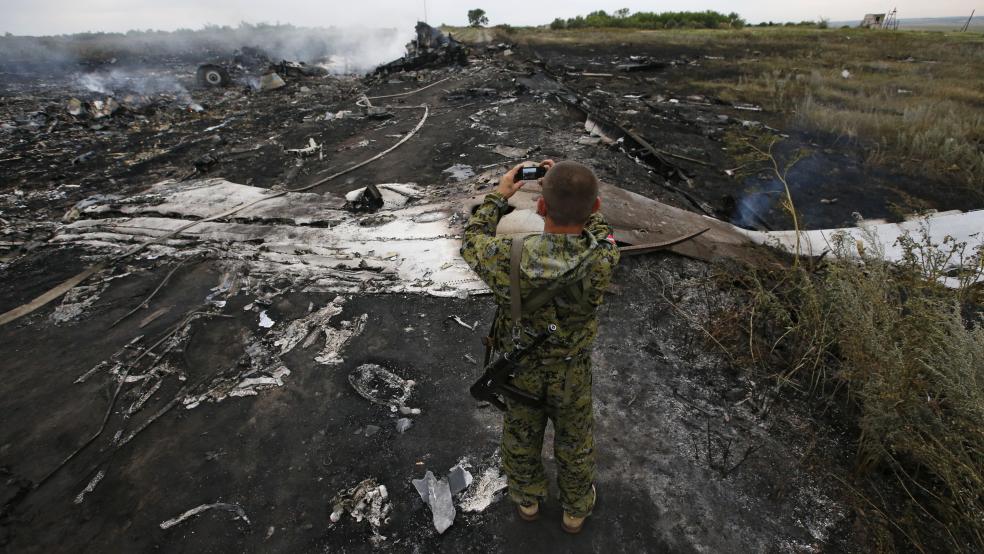A century after the assassination of Austro-Hungarian Archduke Franz Ferdinand, there are eerie parallels between that event, which precipitated World War I, and the downing of Malaysian Airlines flight MH17 in eastern Ukraine yesterday. Then, as now, events are being driven by non-state and semi-state actors with shadowy access to state support. Then, as now, those actors likely committed an atrocity. Then, as now, an overriding concern was whether Russia would intervene if decisive action were taken against the perpetrators.
After Ferdinand was killed in 1914, Germany’s ruler urged haste on his Austrian allies. Kaiser Wilhelm wanted them to use the international shock at the killing to finally settle up with Serbia, which had become the primary instigator of anti-Austrian violence in the Balkans. Wilhelm saw that in the immediate aftermath of the assassination, Serbia would be momentarily isolated, perhaps even from Russia, its closest ally. And Serbia was isolated and willing to pay heavily — as Russia may be today. Had Austria-Hungary not been set on rejecting its concessions, it could have humbled Serbia without the disaster of World War I.
Related: Obama Pledges U.S. Help for Malaysian Plane Probe
That Russia wasn’t isolated by the archduke’s assassination the way Putin’s is by the airliner. It was one degree more removed: sponsor of the sponsor of terrorism, instead of Ivan-on-the-spot. The Austrian-Serb war became the World War because Russia was allied with France and Germany with Austria, and Britain with nobody and Italy with everybody, though somehow it still lost. Moscow has no similar alliances this time: It stands in Serbia’s shoes as the primary sponsor of an atrocity. And despite their truculence, the Serbs agreed after Ferdinand’s killing that punishment was due.
It certainly is so today. Though the perpetrators haven’t yet been identified, the Ukrainian government says that the separatists used a Russian-built Buk anti-aircraft system, known by NATO as an SA-11, to bring down the Malaysian jetliner. It has also released an alleged recording of Russian intelligence officers talking about the separatists’ downing of the airline, and of the bits of bodies lying around.
It’s not proven that the rebels did it, and it is of course in Ukraine’s interest to say so. But it only seems logical that the separatists were responsible: a group of untrained men, under the loosest possible control, using weapons they didn’t completely understand on targets of which they weren’t sure. They had already brought down several Ukrainian aircraft in the past months, including a troop transport on June 13.
Though the Buk system would represent a significant technological upgrade over their previous use of man-portable systems, they may well have acquired it, since air defense has been a focus of their campaign in a way it hasn’t been for Ukraine’s.
Related: Did Russia Just Push the World to the Brink of War?
If, in the coming days, more evidence emerges that the rebels were responsible, it will obviously help Kiev. Ukraine has had to walk a fine line over the past four months: if it waged war too softly, large chunks of the country would be lost to Russian proxies; too hard, and it faced decisive Russian intervention. But it momentarily has a green light: Donetsk may be cast adrift, like the Serbian terrorists, and an intensified Ukrainian campaign to retake its lost territory and finish the war is now possible. Ukraine can settle with the rebels without worrying about Russia — and without worrying about 1914, either.
Like Serbia, Russia may be willing to pay for an outrage on its watch. It has no other choice; the murder of almost 300 airplane passengers will certainly isolate the Kremlin and stiffen NATO’s determination in a way that Crimea did not. With luck, Russia will have read the script, know its part, and not push back, and the Ukrainian war might finally come to an end.
Related: World Leaders Demand Answers after Airliner Downed
If it doesn’t, the entire Putin doctrine of re-intervening in the former Soviet Union — Russia’s “Near Abroad” — may begin to fall apart. The rest of its periphery, never quiet except in the presence of overwhelming military force, would take heart. It could be the beginning of the end of Putinism, such as it is, and of Greater Russia and the revanchism that currently possesses the Kremlin.
Or not. Or Russia, humiliated in Donetsk, might become even more determined to show its military might in Georgia, again, or Estonia, or Finland. But nationalism is dangerous thing. In George R.R. Martin’s Game of Thrones series, sorcery is called “a sword without a hilt.” Nationalism is the same. It’s popular and useful for a leader right until he starts losing, and then it can turn on itself.
Russia — Putin — has had almost an unbroken string of geopolitical successes over the past ten years. He’s won the war in Chechnya, humbled Georgia, eliminated the proposed U.S. missile defense sites in Poland and the Czech Republic, kept Bashar Assad in power, annexed Crimea, and been feted as part of the Obama administration’s “reset” policy.
It’s a pretty good streak, but the world has never seen Putin in defeat. How deep is his support? How will his nationalists react to failure? How far beyond Mikhail Khodorkovsky and Pussy Riot does opposition to Putin go? We may find out.
Top Reads from The Fiscal Times:






